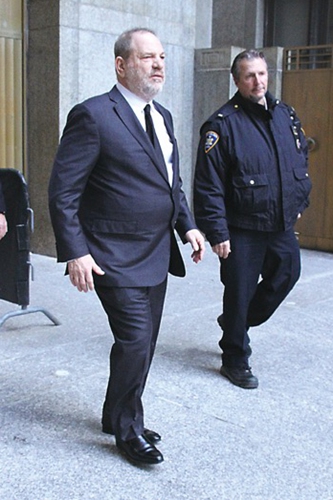No verdict as Weinstein rape trial jury ends day one deliberations
Source:AFP Published: 2020/2/19 17:43:41

Harvey Weinstein Photo: IC
Jurors in ex-Hollywood titan Harvey Weinstein's high-profile sex crimes trial ended their first day of deliberations Tuesday without reaching a verdict in the case seen as a watershed in the #MeToo movement.The disgraced movie mogul, 67, faces life in prison if the jury of seven men and five women convict him of a variety of sexual misconduct charges in New York.
They began considering their verdict just before 11:30 am and adjourned five hours later. They will reconvene on Wednesday at 9:30 am local time.
More than 80 women have accused Weinstein of sexual misconduct since allegations against him ignited the #MeToo global reckoning against men abusing positions of power in October 2017.
But the jury is considering charges related to just two: ex-actress Jessica Mann and former production assistant Mimi Haleyi, with many claims too old to prosecute.
Mann, 34, says Weinstein raped her in March 2013, while Haleyi alleges he forcibly performed oral sex on her in July 2006.
The trial, which began hearing testimony on January 22, threw up complicated issues surrounding consent and abuse of power for the jury.
Under cross-examination, both Mann and Haleyi acknowledged at least one consensual sexual encounter with Weinstein after the alleged assaults.
Defense lawyers presented dozens of emails and text messages in court that appeared to show both Mann and Haleyi on friendly terms with Weinstein years after the alleged attacks.
His team said the relationships were consensual and transactional, arguing that the accusers used sex with the defendant to advance their own careers.
Burden of proof
Prosecutors said he was an aggressive and manipulative career sexual predator who took advantage of his powerful position in the US film industry to prey on aspiring young actresses.
Weinstein, the producer of Pulp Fiction and Sin City, is the first man accused of abuse in the #MeToo movement to face a criminal trial.
In closing arguments Thursday, lead attorney Donna Rotunno urged the 12 jurors to make themselves "unpopular" by acquitting him, telling them his innocence had been clear from the start.
She stressed that prosecutors had failed to present any forensic evidence or witness accounts.
The prosecution's case rests on whether the jury believes the six women, including actress Annabella Sciorra of The Sopranos, who testified that Weinstein had sexually assaulted them.
Lead prosecutor Joan Illuzzi-Orbon said in her closing arguments Friday that they had "no motive to lie."
"They sacrificed their dignity and privacy and peace for the prospect of having that voice" heard, she said.
Father-of-five Weinstein wore a light gray suit as he hobbled into court using a walker - a feature of his trial appearances - to hear Justice James Burke instruct the jury.
The judge reminded jurors that to convict, they must be sure of Weinstein's guilt beyond a reasonable doubt.
"If the people fail to satisfy their burden of proof you must find the defendant not guilty," Burke said.
Los Angeles case
Weinstein faces five counts: two of predatory sexual assault, two of rape and one of engaging in a criminal sexual act.
The jury must reach unanimous verdicts on each count. If they cannot, the judge may be forced to declare a mistrial, which could mean a fresh trial with new jurors.
A split verdict is possible where Weinstein is convicted of some charges and cleared of others.
The jury asked Burke why it could convict Weinstein of predatory sexual assault related to Sciorra when the statute of limitations prevents it from ruling on her rape allegation against him.
"They're almost reaching for what can we find him guilty of," former New York City prosecutor Roger Canaff told AFP.
"To me that's pretty powerful. I'd be worried about if I were Weinstein or on his team," he added.
Even if found not guilty, Weinstein's legal troubles are far from over.
He is facing a separate sex crimes investigation in Los Angeles and is also the subject of several civil complaints.
Newspaper headline: Up in the air